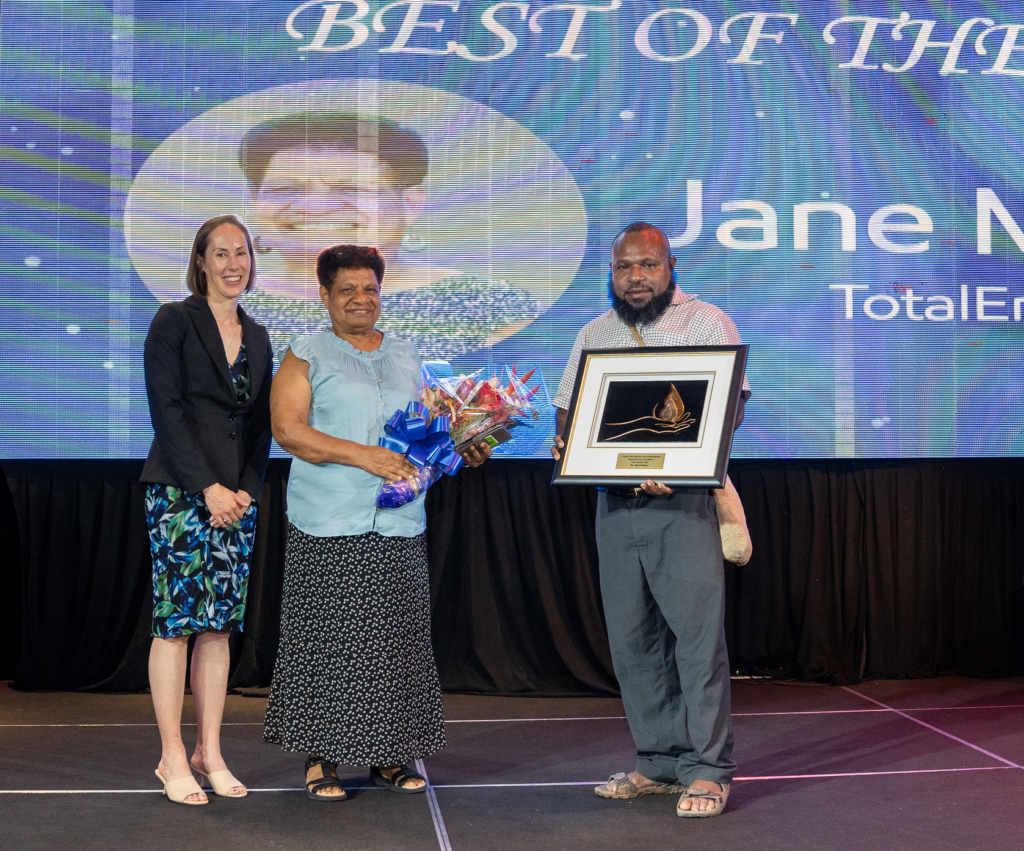Wearing several hats as the Biodiversity and International Finance Corporation Advisor at TotalEnergies EP PNG (TEP PNG) is no easy feat for anyone, but the inaugural recipient of PNG’s ExxonMobil Power Play Pioneer Award Dr Jane Mogina makes it all look so effortless.
The LNG Power Play Awards were developed by female pioneers from ExxonMobil to help bring together women in the LNG industry to network and do business. What began as a pilot project at the global LNG conference in 2016, is now a successful series of events taking place all over the world.
Becoming the first Papua New Guinean to be awarded the Global Pioneer Award at Gastech 2023 in Singapore, Dr Jane joins an exclusive club of Power Players from around the world, recognised for their contributions to the Liquefied Natural Gas (LNG) industry.
An educator, a mountain climber, a biodiversity expert but a proud mother first and foremost, in every sense of the word, she is an iconic pioneer. A shining example of what you can achieve if you set your mind to it and pursue your dreams without apology.
Born in Bogaboga village, North Coast Milne Bay, the fourth of seven children, she has always had an avid fascination with science and describes her passion for biology as intrinsic to who she is as a person.
Having been brought up in the village, she had an insatiable curiosity for how things worked. Her relationship with her father and in turn his relationship with nature, inspired her own relationship with nature.
“My father was a hunter. He always hunted for big occasions; it’s my dad who would always go hunting. I followed him everywhere and I always enjoyed when he would explain why we went to certain places,” she adds.
“My village was right on the beach front, so we were facing the sea so you know when you wake up in the morning, I was always amazed at how he could tell how a certain type of fish was feeding if the sea looked a certain way,” she says.
When she was sent to live with a relative, she was given unprecedented access to a school library and she recalls how much she loved flipping through books.
“In some of the old encyclopaedias: what triggered my interest was this particular volume, that the anatomy of a frog separated by transparent papers – you flip one page and see what’s under the skin – the muscle structure,” she explained.
“It was that which fascinated me. I can still remember always going back to that same book, over and over and over again. It was a frog that got me into biology,” she adds.
At 14, when she was in grade 9, she was able to replicate famous Biologist Grego Mendel’s experiment of cross breeding to determine the laws of inheritance on mice.
“I started off with breeding mice and from those breeding experiments, what I did was separate pure breeding individuals from non-pure breeding individuals and we distributed the pure breeds to a lot of secondary schools in Milne Bay,” she said.
When she attended Holy Name High School in Alotau, run by Anglican nuns she was highly encouraged by her teachers to pursue her love for microbiology.
“One of the nuns was a microbiologist and she taught me how to separate different groups of protozoans so that I would have cultures where it was just paramecium, different groups. I used to be so excited, that I would set up microscopes at the back of the lab for anyone passing by to come and see,” she said nonchalantly.
Counting herself as privileged, in terms of her education and encounters, she completed grades 7 to 10 at Holy Name then went on to do grades 11 & 12 at Sogeri National High School in 1977 and 1978.
She entered her first year at the University of Papua New Guinea (UPNG) in 1979, a member of the Science faculty and studied biology, specialising in Forest Ecology. While she was still training to be a teacher she worked as a tutor in the biology department
Going on to become the first national biology teacher at Sogeri National High School, she started off as a volunteer and after receiving her accreditation as a teacher in 1984 and then was formally employed by the school the following year.
“I first joined the university professionally in 1984 and during that time I also did a diploma in Education, so in 1985, I first started teaching at Sogeri National High School as a science teacher,” she says.
Pursuing her Masters between 1989 to 1990, she was back at UPNG as a lecturer in the Science Education departments and there she remained from 1992 to 2006.
Dr Jane successfully defended her Doctoral thesis in 2002 at the Australian National University, looking at the knowledge of plants in modern societies in PNG, comparing two different communities in Milne Bay, she returned to UPNG as a lecturer until 2006.
Reflecting on her time as an educator, she shared that she was part of the team that drafted the National Science curriculumand was the Grade 12 examiner for the country from 1986 to 2004 but revealed that her biggest accolade is her family.
“My children are my biggest achievement; it’s not my PhD,” she declares breaking into a hearty laugh.
Between 2006 and 2012, she left the education sector to work with Non-Governmental Organisation (NGO) Mama Graun Conservation Trust Fund.
She left the NGO in 2012 after successfully serving three terms as Managing Director, following which, she joined ExxonMobil PNG as their Senior Biodiversity Advisor remaining with them until 2020.
“Everything that we were doing (at PNG LNG) at the time was new, especially in the environment and social space. Our task was to make sure that PNG’s biodiversity was protected but make sure that the PNG LNG Project went ahead,” she shared.
When Covid-19 hit, Jane found herself juggling three different jobs. In addition to providing consulting services for Exxon, she was offering her services pro-bono as a supervisor to four Masters students at UPNG as well as consulting with the United Nations Environment Program.
“During Covid, I liked the fact that work kept me busy because if you think about it; a lot of people left employment. There was a lot of pain in the community and some of what I did, I got paid for but I needed to be kept busy and so the supervision was something I did without pay,” she said.
The Power Play Awards
To mark the fifth year of the awards, ExxonMobil introduced the program in PNG, to recognise the accomplishments and contributions women and men provide to the industry within three categories: the Rising Star, the Pioneer and the Ambassador.
“I was still in the company when the Power Play Awards were launched, so I knew about the awards but it wasn’t in PNG – most of it took place in established affiliates like in the US and Europe,” she recalls.
She stressed that because the PNG LNG Project was the first of its kind for PNG, there had to be a large presence of home-grown knowledge.
“When we first started, I said to all the biodiversity consultants, start with 30% Papua New Guineans, I want you to structure your program so that within five to six years, you are trending towards 100% Papua New Guinean and that was my personal commitment,” she said.
She attests that within two of the three programs that she oversaw, under five years, both programs were carried out and undertaken by Papua New Guinean experts.
She was instrumental in ensuring that a good majority of the biodiversity staff at PNG LNG were nationals.
On her acceptance of being a Global Pioneer, she jokes that she wasn’t even aware that she had won until they ushered her to the stage, as they had showed her picture on screen announcing her as the finalist.
“I really feel honoured by it. When you talk about LNG and the development of this [PNG LNG] Project; that was a really new industry for PNG,” she stated.
Protecting PNG’s Biodiversity
Looking back on her time at Exxon, she sets the PNG LNG Project as the benchmark, affirming that her team’s task was to ensure that PNG’s biodiversity was protected whilst ensuring the Project went ahead, a daunting task for anyone.
In her capacity as the Biodiversity and IFC advisor at TEP PNG, she is the voice of reason for all biodiversity conservation programs concerning the Papua LNG Project, operated by French multi-energy company TotalEnergies.
A firm believer that you only appreciate something once you’ve lost it, she would like to see more Papua New Guineans recognise and protect the natural biodiversity we have now before it is too late.
“The key thing about biodiversity is, if you know a lot about it, you will want to protect it. If you’re ignorant, if you don’t know what’s out there then you’re not that committed,” she said.
“We are only now, starting to get an increasing number of big industries coming into PNG and with any big developments, we are connecting roads right across to PNG,” she added.
She stresses that this only exposes areas previously isolated and therefore all contributes in one way or another, to the degradation of biodiversity.
“Whether you work in Oil & Gas, or you’re a government advisor; you need to appreciate and recognise that degradation will happen, so let’s not repeat the mistakes of other countries,” she said.
“It’s important that young Papua New Guineans appreciate what we have, so that you are out there trying to protect that biodiversity,” she added.
Her contributions thus far have been paramount to Biodiversity preservation and protection; through her work within the industry, as a civil society advocate and as an educator.
She maintains that if you say you’re going to protect PNG’s biodiversity, it is important to recognise that you need follow through with evidence, adding that you should never be complacent about life.

- Dr Jane receiving her Pioneer Award at the Inaugural 2023 PNG Power Play Awards in June.
Pictures courtesy of ExxonMobil LNG. – Picture courtesy of ExxonMobil LNG

